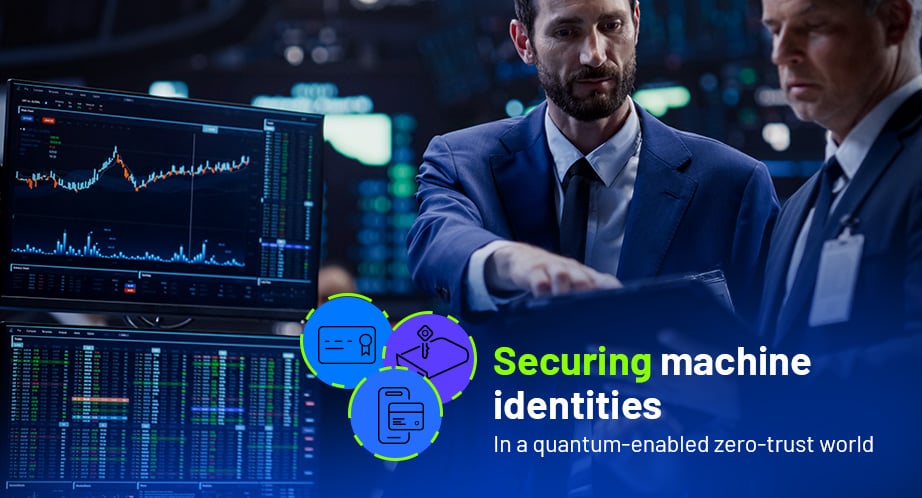Machine identities, digital credentials for servers, services, containers, IoT devices, API endpoints, and increasingly AI agents, are foundational to modern digital trust.
As remote work, cloud-first architecture, and AI-driven automation flood enterprises, non-human entities vastly outnumber and often outpace traditional user-based accounts. This surge introduces a complex new attack surface.

Today, two seismic shifts collide in the cybersecurity landscape:
- Quantum computing, poised to break current cryptographic schemes, rendering machine and human identity safeguards vulnerable.
- Zero-trust architectures, demanding “never trust, always verify” principles for every identity, be it human or machine, at every request.
Overlaying this is Identity and Access Management (IAM)’s expanding role: not just for humans, but as the essential bridge orchestrating Zero Trust, cryptographic integrity, and granular access control for all identities. Below, we explore why modern IAM is central to securing machine IDs against quantum threats in a Zero Trust reality.
The rise of machine identities in a zero-trust world
Machine identities refer to the digital certificates, cryptographic keys, and credentials used by non-human entities to authenticate and communicate securely. These include workloads in CI/CD pipelines, IoT and edge devices, containerised services, APIs and cloud-native microservices.
In modern cloud and hybrid architectures, machine-to-machine interactions now outnumber human authentications many times over. These interactions are highly automated, ephemeral, and distributed, making traditional, manual identity management approaches ineffective and risky.
As organisations adopt Zero Trust, machine identities move from being an infrastructure detail to a primary control point for security.
Why zero trust requires robust machine identity management
Zero trust assumes breach. Every request, internal or external, must be authenticated, authorised, and continuously evaluated.
Machine identity plays a foundational role in this:
- Mutual authentication between machines is essential to prevent man-in-the-middle and spoofing attacks.
- Short-lived, context-aware credentials limit exposure and enforce least privilege access.
- Device posture and trust context influence access decisions, especially for IoT, edge, or unmanaged environments.
- Automated lifecycle management reduces the risk of expired certificates, stale credentials and service outages.
To deliver this at scale, organisations increasingly rely on standards-based certificate enrolment and management protocols, such as ACME, CMP, EST, and SCEP, which enable secure, policy-driven issuance and renewal of machine identities without human intervention.
Security professionals must treat machine identities with the same discipline as human ones, backed by automated, governance, and continuous enforcement.
The quantum threat to identity
Quantum computing is no longer a theoretical concern. It introduces a real and imminent threat to existing cryptographic algorithms that underpin digital identity.
How does quantum break existing cryptography?
Once sufficiently advanced, quantum computers will use algorithms like Shor’s to break RSA, ECC, and Diffie-Hellman, the foundation of most digital certificates, TLS connections, VPNs, and code signing mechanisms in use today.
This creates two major risks:
- Harvest now, decrypt later – Encrypted traffic can be captured today and decrypted in the future once quantum capabilities mature.
- Machine identity vulnerability – Certificates and keys securing automated systems today may become vulnerable, enabling impersonation, tampering, and unauthorised access.
Quantum-readiness demands action today
Governments and standards bodies are already urging organisations to prepare:
- NIST has standardised post-quantum cryptography (PQC) algorithms such as Kyber (encryption) and Dilithium (signatures) to replace vulnerable schemes.
- Enterprises must inventory all cryptographic assets, identify where vulnerable algorithms are in use, and plan phased migration strategies.
- Machine identities are often overlooked, despite their heavy reliance on RSA or ECC for authentication and encryption.
Waiting until quantum computing becomes mainstream will leave organisations dangerously exposed. Crypto agility must be built into identity systems now.
IAM: The central nervous system for identity and trust
Identity and Access Management (IAM) has evolved far beyond user authentication. It’s now the orchestration layer that connects Zero Trust enforcement, cryptographic policy, and identity governance across both human and non-human entities.
IAM 3.0 - Autonomous, contextual, and quantum-aware
Modern IAM systems are:
- Contextual – Evaluating behavioural signals, device risk posture, geolocation, and usage patterns.
- Autonomous – Using AI and machine learning to adapt policies, automate access decisions, and detect anomalies.
- Crypto-agile – Supporting multiple cryptographic protocols, with the ability to swap algorithms and update credentials at scale.
Increasingly, IAM solutions integrate with certificate authorities (CAs) and registration services to discover machine identities, apply policy, automate lifecycle management, and enforce Zero Trust controls consistently across environments.
How IAM supports machine identity management
As machine identities grow in number and complexity, Identity and Access Management (IAM) platforms are expanding to deliver deeper visibility, stronger governance, and automated control.
Modern IAM doesn’t just manage user access. It secures machine identities across their entire lifecycle by integrating with PKI and automated enrolment services.
IAM systems now support:
- Machine identity discovery – Identifying certificates, keys, and tokens across hybrid and multi-cloud environments.
- Lifecycle management – Automating issuance, renewal, and revocation using standard protocols.
- Policy enforcement – Mapping identity attributes to access privileges and Zero Trust rules
- Post-quantum transition – Supporting hybrid cryptographic models combining classical and quantum-safe algorithms.
These capabilities transform IAM into a critical pillar of both cybersecurity and operational resilience.
What’s new in 2026: Machine identity, IAM, and quantum trends
In 2026, machine identities aren’t a secondary concern. They are central to enterprise security strategies.
This shift is driven by several converging forces: the rise of generative AI, accelerated Zero Trust adoption, growing automation, quantum disruption, and the complexity of hybrid and multi-cloud environments.
Together, these trends are forcing organisations to adopt more intelligent, automated, and futureproof identity strategies.
Key trends
| Trend | Description |
|---|---|
| AI-driven IAM | Machine learning for anomaly detection, dynamic access, and risk scoring. |
| Machine identity lifecycle management | Certificate issuance, rotation, and revocation integrated into CI/CD pipelines. |
| Post-quantum cryptography (PQC) | Adoption of hybrid models using NIST-approved algorithms. |
| Ephemeral credentials | Short-lived certificates and just-in-time access replacing long-lived secrets. |
| Decentralised identity (DID) | Verifiable credentials for third-party and machine identities. |
| Identity Threat Detection and Response (ITDR) | Real-time detection of identity misuse and lateral movement. |
A framework for securing machine identities
Securing machine identities requires a cohesive, organisation-wide strategy, not isolated tools or manual processes.
Below is a step-by-step framework to help enterprises build a scalable, Zero Trust-aligned, and quantum-ready machine identity programme.
-
Inventory and discovery
- Identify all machine identities: certificates, tokens, SSH keys, service accounts, and cloud IAM roles
- Map their usage, algorithms, trust relationships, and expiration schedules
-
Assess cryptographic risk
- Evaluate all machine identities against cryptographic standards
- Identify those using RSA, ECC, or other vulnerable algorithms
-
Classify based on:
- Sensitivity
- Exposure
- Operational impact
-
Enable automation
- Integrate certificate issuance and renewal into CI/CD pipelines and device onboarding
- Use standard protocols such as ACME, CMP, EST, and SCEP
- Enforce rotation policies and eliminate hardcoded credentials
-
Build crypto agility
- Support hybrid cryptographic models
- Ensure systems can easily swap cryptographic algorithms without disruption
- Align with NIST’s migration roadmap for PQC adoption
-
Enforce Zero Trust policies
- Require mutual TLS for machine communications
- Incorporate contextual signals into access decisions
- Apply least-privilege principles to automated services
-
Govern and audit
- Monitor machine identity usage
- Log issuance, renewal, and revocation events
- Include machine identities in compliance and audits programmes
-
Extend to ecosystem and third parties
- Apply Zero Trust to integrations and supply chains
- Issue short-lived credentials to external services
- Detect anomalous or unauthorised machine behaviour
How Ascertia helps secure machine identities
As the machine identity risks escalate and quantum disruption approaches, Ascertia provides the digital trust infrastructure organisations need, today and into the future.
Trusted solutions built for security and scale
Ascertia’s portfolio combines a high-assurance certificate authority with automated registration and lifecycle management, enabling organisations to secure machine identities at scale while aligning with Zero Trust and quantum-readiness goals.
- High-trust Public Key Infrastructure (PKI)
- ADSS Server delivers a scalable, standards-compliant Certificate Authority (CA) for machines, users, and devices
- Full 509 support enables mutual TLS and secure machine-to-machine communication
- Automated machine identity lifecycle management
- Web RA Server provides the automation layer for machine identities
- Supports ACME, CMP, EST, and SCEP for secure enrolment, renewal and revocation
- Enables policy-driven issuance of short-lived certificates for cloud workloads, DevOps pipelines, IoT devices, and APIs
- Integrates seamlessly with CI/CD, orchestration, and provisioning platforms
- Crypto agility and quantum readiness
- Built to support algorithm transitions and hybrid cryptographic models
- Roadmapped support for NIST-aligned Post-quantum Cryptography ensures long-term trust
- Interoperability and standards compliance
- Integrates with leading IAM platforms, HSMs, and trust anchors
- Complies with eIDAS, WebTrust, and Common Criteria
- Policy-based trust and governance
- Granular access control, approval workflows, revocation policies, and audit logging
- Ensures Zero Trust enforcement across automated environments
- Trusted timestamping and digital signing
- Provides non-repudiation and long-term integrity for machine-generated data
- Essential for regulated industries and automated workflows
By combining ADSS Server and Web RA Server, Ascertia delivers a complete, standards-based machine identity infrastructure that scales with automation and remains resilient in a quantum future.
Building resilience through trusted machine identity
Machine identities shouldn’t be a background consideration for any organisation. They are central to securing digital transformation, cloud-native operations, and AI-driven automation.
As quantum computing draws closer and attackers become more advanced, organisations must ensure machine identities are:
- Managed with the same discipline as user identities
- Governed through automation and continuous policy enforcement
- Protected with crypto-agile and quantum-ready infrastructure
IAM provides the platform unify these elements, enabling Zero Trust, cryptographic resilience, and operational agility.
By acting now, organisations can build a secure, scalable, and futureproof identity foundation that supports innovation without compromising trust.
Ready to modernise your machine identity infrastructure?
Discover how Ascertia’s digital trust solutions can help you secure machine identities, automate certificate lifecycle management, and prepare for a quantum-safe future.
Get in touch with our team of experts to discuss how we can help.


